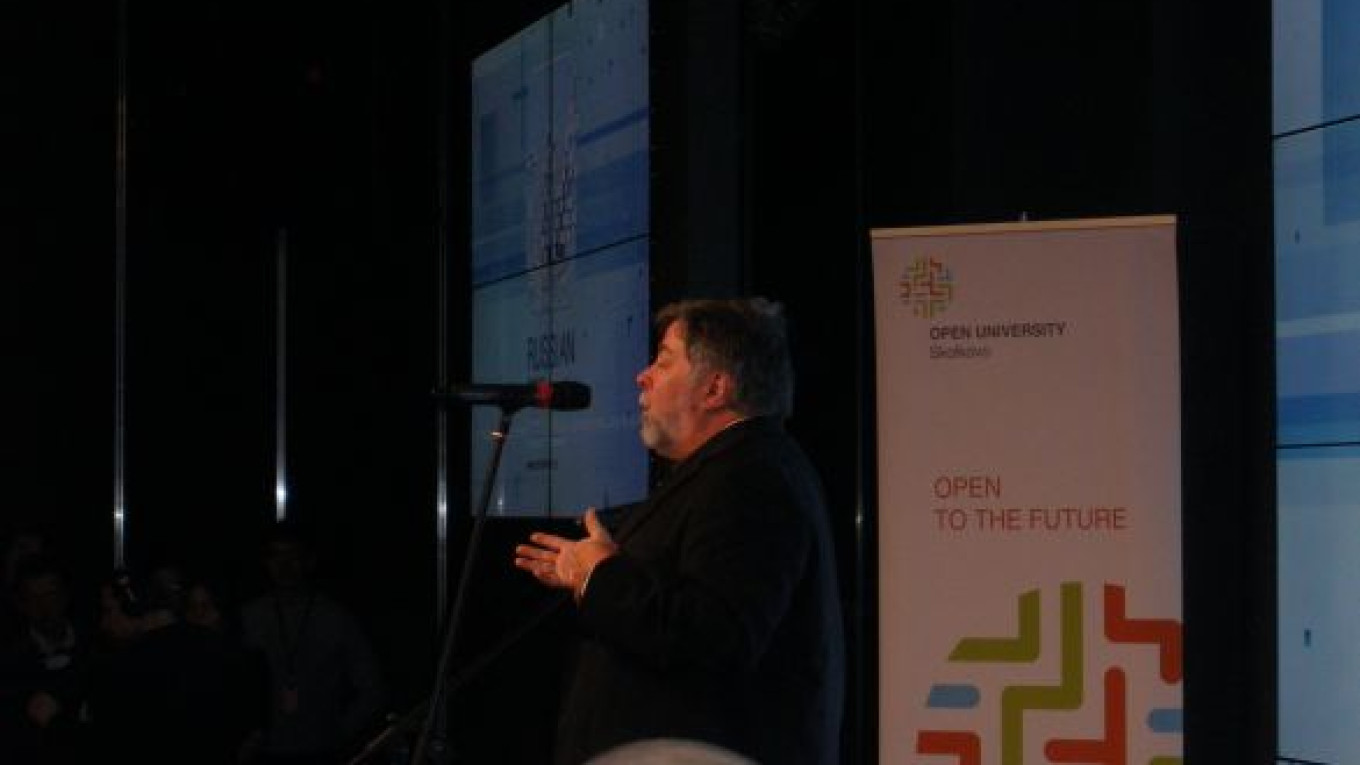Apple co-founder Steve Wozniak visited Moscow on Tuesday for the fourth annual Innovation Convention to inspire a room overflowing with young, aspiring entrepreneurs to abandon their fears and think "outside the box."
"A lot of people are afraid," Wozniak said. "When you grow up, you go to school and they teach you that the answers are in the book. … you go to the book and find out how something is done. If you are smart, you can actually start to think it out, work it out to write the book yourself."
The event was largely attended by Internet startups and guests such as Angry Birds founder and general director Peter Vesterbaka and Facebook sales director Kevin Colleran.
The number of regular Internet users in Russia has grown to 50.8 million — the largest for any European country — according to market research company ComScore. The Public Opinion Foundation says the number is expected to approach 80 million by 2014.
Excluding the initial public offering of search engine Yandex, the size of investments and deals with Internet companies in Russia this year reached $500 million, according to Fast Lane Ventures, an investor in startups that also provides practical development assistance.
However, many smaller Russian Internet startup companies are finding it difficult to achieve success, even if they have "written the book."
"We have no investor now," said Anton Shkalyov, technical manager for GetShopApp — a phone application that provides advertising services to restaurants and retailers. "The investor would be mainly for marketing purposes. Our main problem has been to promote ourselves on the market."
"A lot of them come with an idea that is not well thought out," said Fast Lane Ventures CEO Marina Treshchyova. "Sometimes it is really such a big dream that we don't even have any type of benchmark." As a result, she said, the majority of projects her company does are based upon proven models.
Fast Lane Ventures plans to have had 15 on their feet by the end of this year. Their model is to analyze foreign markets, primarily the United States, and then introduce similar companies into the county where the service or product does not exist.
"The fundamental problem is daring," said Telemind.tv co-founder Maxim Usubyan. "The tendency is to copy what is in America and in Europe. And the startups you will see here [at the convention] are in some way better than at least European startups, but investors are oriented to that copy-and-paste model."
"Most of the letters [we receive] are 'I have a good idea, please give some money and then we can make something happen.' They do not know how to present the ideas and we believe that there are many good ideas in Russia, but people do not know what to do with these ideas," said Lada Shcherbakova, Fast Lane's press director.
Wozniak offered some perspective so that sapling entrepreneurs could understand that it's possible to take their project from the garage to a global company.
"Keep this in mind: Steve Jobs and I were in our early 20s, we had no college degrees, we had no business experience. We had never even taken a business course in college. We had no money, we had no savings accounts, no relatives or friends to loan us money. We had to do everything on our own."
A Message from The Moscow Times:
Dear readers,
We are facing unprecedented challenges. Russia's Prosecutor General's Office has designated The Moscow Times as an "undesirable" organization, criminalizing our work and putting our staff at risk of prosecution. This follows our earlier unjust labeling as a "foreign agent."
These actions are direct attempts to silence independent journalism in Russia. The authorities claim our work "discredits the decisions of the Russian leadership." We see things differently: we strive to provide accurate, unbiased reporting on Russia.
We, the journalists of The Moscow Times, refuse to be silenced. But to continue our work, we need your help.
Your support, no matter how small, makes a world of difference. If you can, please support us monthly starting from just $2. It's quick to set up, and every contribution makes a significant impact.
By supporting The Moscow Times, you're defending open, independent journalism in the face of repression. Thank you for standing with us.
Remind me later.


